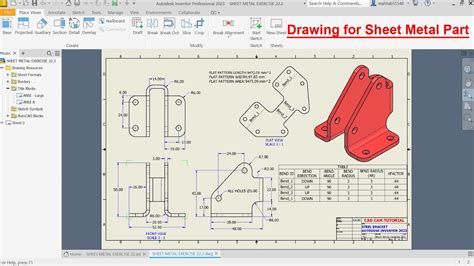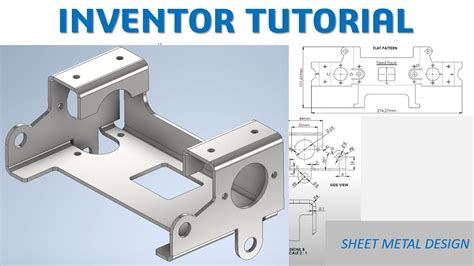autodesk inventor sheet metal flat pattern Use a flat pattern, which is the shape of the sheet metal part before it is formed, to . Unlike a traditional box spring, this cleverly crafted foundation is made with a thick .
0 · sheet metal drawing in inventor
1 · inventor sheet metal tutorial pdf
2 · inventor sheet metal flat pattern
3 · inventor flat pattern not working
4 · inventor convert to sheet metal
5 · define a side inventor
6 · create flat pattern inventor
7 · Autodesk Inventor sheet metal tutorial
Projects - Home - Zinger Sheet Metal
The flat pattern view is useful for fabrication, and is the only view that supports sheet metal annotations. You can create a folded model view and a flat pattern view for a sheet metal part .To develop a flat pattern, Autodesk Inventor must start with a model that has a .
how much does it cost to replace electric meter box
To create a flat pattern from a part created using only conical or cylindrical features .Use a flat pattern, which is the shape of the sheet metal part before it is formed, to .You have imported some sheet metal parts from a SAT, IGS, or STEP file into .
When trying to create a sheet metal flat pattern an Inventor tip comes up and .
how much electricity does a lasko box fan use
To Work with Flat Pattern in Sheet Metal You can create a flat pattern from a .In this session, we’ll start from scratch and create a sheet metal part to generate a .Within the Autodesk Inventor design environment, a sheet metal part can be . In the video I showed a tool that is used to create flat patterns from non-linear bent sheets. The surface I got is a flat sheet pattern; it can be exported to DXF, right click and select Export surface as. You can also create a solid .
how much is a electrical box
To develop a flat pattern, Autodesk Inventor must start with a model that has a consistent thickness—just like a sheet of metal in real life. This issue often arises when you build a ‘master’ component, split it up, and derive .
To create a flat pattern from a part created using only conical or cylindrical features and then converted to sheet metal, preselect a curved face. You can reorient a flat pattern using any .Use a flat pattern, which is the shape of the sheet metal part before it is formed, to create drawings for manufacturing. Flat patterns show bend lines, bend zones, punch locations, and . You have imported some sheet metal parts from a SAT, IGS, or STEP file into Inventor. You want to know how to prepare them to avoid problems when creating the Flat . When trying to create a sheet metal flat pattern an Inventor tip comes up and when OK is selected nothing happens for a sheet metal flat pattern. Flat pattern from body with overridden rule is not supported. Use 'Edit .
To Work with Flat Pattern in Sheet Metal You can create a flat pattern from a sheet metal model and display the correct iProperties for a folded model and a flat pattern. To Work with a Sketch .
In this session, we’ll start from scratch and create a sheet metal part to generate a flat pattern, export a DXF cut file, and create drawings with dimensioned bend lines. Discover best practices, things to avoid, and practical advice.

Within the Autodesk Inventor design environment, a sheet metal part can be displayed as a folded model or a flat pattern. With sheet metal commands, you can unfold features and work on a model in a flattened state, and then refold .The flat pattern view is useful for fabrication, and is the only view that supports sheet metal annotations. You can create a folded model view and a flat pattern view for a sheet metal part or iPart (The Flat Pattern option is available only if a flat pattern exists in the source file.)
sheet metal drawing in inventor
inventor sheet metal tutorial pdf
In the video I showed a tool that is used to create flat patterns from non-linear bent sheets. The surface I got is a flat sheet pattern; it can be exported to DXF, right click and select Export surface as. You can also create a solid from this surface - just use the thicken tool. To develop a flat pattern, Autodesk Inventor must start with a model that has a consistent thickness—just like a sheet of metal in real life. This issue often arises when you build a ‘master’ component, split it up, and derive the bodies into Sheet Metal parts.
To create a flat pattern from a part created using only conical or cylindrical features and then converted to sheet metal, preselect a curved face. You can reorient a flat pattern using any straight feature edge, virtual line between two vertices, or line of tangency.
inventor sheet metal flat pattern
Use a flat pattern, which is the shape of the sheet metal part before it is formed, to create drawings for manufacturing. Flat patterns show bend lines, bend zones, punch locations, and the shape of the entire part with all bends flattened and bend factors considered. You have imported some sheet metal parts from a SAT, IGS, or STEP file into Inventor. You want to know how to prepare them to avoid problems when creating the Flat Pattern for the individual sheets. Some prerequisites have to be fulfilled before creating the Flat Pattern of a sheet metal part. When trying to create a sheet metal flat pattern an Inventor tip comes up and when OK is selected nothing happens for a sheet metal flat pattern. Flat pattern from body with overridden rule is not supported. Use 'Edit Sheet Metal Rule' on the body and make it follow the sheet metal defaults."
To Work with Flat Pattern in Sheet Metal You can create a flat pattern from a sheet metal model and display the correct iProperties for a folded model and a flat pattern. To Work with a Sketch Copied to a Flat Pattern You can copy a sketch to a flat pattern, delete it, control sketch visibility, and break the link between sketches.
In this session, we’ll start from scratch and create a sheet metal part to generate a flat pattern, export a DXF cut file, and create drawings with dimensioned bend lines. Discover best practices, things to avoid, and practical advice.Within the Autodesk Inventor design environment, a sheet metal part can be displayed as a folded model or a flat pattern. With sheet metal commands, you can unfold features and work on a model in a flattened state, and then refold the features.
The flat pattern view is useful for fabrication, and is the only view that supports sheet metal annotations. You can create a folded model view and a flat pattern view for a sheet metal part or iPart (The Flat Pattern option is available only if a flat pattern exists in the source file.) In the video I showed a tool that is used to create flat patterns from non-linear bent sheets. The surface I got is a flat sheet pattern; it can be exported to DXF, right click and select Export surface as. You can also create a solid from this surface - just use the thicken tool. To develop a flat pattern, Autodesk Inventor must start with a model that has a consistent thickness—just like a sheet of metal in real life. This issue often arises when you build a ‘master’ component, split it up, and derive the bodies into Sheet Metal parts.

To create a flat pattern from a part created using only conical or cylindrical features and then converted to sheet metal, preselect a curved face. You can reorient a flat pattern using any straight feature edge, virtual line between two vertices, or line of tangency.
Use a flat pattern, which is the shape of the sheet metal part before it is formed, to create drawings for manufacturing. Flat patterns show bend lines, bend zones, punch locations, and the shape of the entire part with all bends flattened and bend factors considered. You have imported some sheet metal parts from a SAT, IGS, or STEP file into Inventor. You want to know how to prepare them to avoid problems when creating the Flat Pattern for the individual sheets. Some prerequisites have to be fulfilled before creating the Flat Pattern of a sheet metal part. When trying to create a sheet metal flat pattern an Inventor tip comes up and when OK is selected nothing happens for a sheet metal flat pattern. Flat pattern from body with overridden rule is not supported. Use 'Edit Sheet Metal Rule' on the body and make it follow the sheet metal defaults."
To Work with Flat Pattern in Sheet Metal You can create a flat pattern from a sheet metal model and display the correct iProperties for a folded model and a flat pattern. To Work with a Sketch Copied to a Flat Pattern You can copy a sketch to a flat pattern, delete it, control sketch visibility, and break the link between sketches.In this session, we’ll start from scratch and create a sheet metal part to generate a flat pattern, export a DXF cut file, and create drawings with dimensioned bend lines. Discover best practices, things to avoid, and practical advice.
how much electricity does a dvr box use
how much for small house metal roof
電源接線盒(英文:Junction box,簡稱Jbox )是容納電源連接的外殼,用於保護電源連接並提供安全屏障。
autodesk inventor sheet metal flat pattern|inventor sheet metal flat pattern